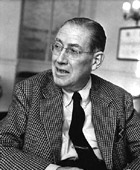A master of light, whimsical, and sometimes nonsensical verse, Nash started his writing career at Doubleday Page Publishers, where he wrote his first children's book with Joseph Algers, The Cricket of Garador, in 1925. After six years of writing advertising copy as an editor and publicist at Doubleday, Nash claimed, he began his career in humorous poetry by scribbling one afternoon. His scribbles were to become a poem called Spring Comes to Murray Hill, which he threw away. Upon some thought, however, he retrieved it from the wastebasket and sent it to The New Yorker. His first piece of satiric verse was published in 1930.
After "Murray Hill" Nash's work began to appear in other periodicals. He was prolific enough that he published a collection of his poetry, Hard Lines, in 1931. Hard Lines sold out seven printings in its first year and catapulted Nash into his role as the master of light verse. In 1932 Nash left Doubleday to join the editorial staff of The New Yorker. His steady and lengthy affiliation with the magazine helped establish its distinctive tone and sense of humor. According to poet Archibald MacLeish, Nash "altered the sensibility of his time." Even after the widespread reception of his first book, however, Nash still insisted that the whole thing was an accident. He had already become quite popular with the general public through his work in The New Yorker and "Information Please," a radio quiz show. Eventually he began to write full-time, publishing over two dozen books of poetry and prose in his lifetime.
In an environment in which people cared little about poetry, Nash managed to be one of the most popular and most quoted poets of his time, coining such phrases as "candy is dandy but liquor is quicker." His turn of the phrase, his puns, and his nonsensical rhymes appealed to people of all ages. While speaking in the Library of Congress auditorium, Nash suggested that the average man, surviving the perils of the nuclear age, needed not only missiles, submarines, and a fallout shelter, but also a few lighthearted laughs to save him.
Although the Atlantic Monthly heralded Nash as "God's gift to the United States" for his insightful commentary on 20th-century America, his work had international appeal. He was known as the Everyman of his time, the poet of the ordinary and universal. His poems were humorous not only because they made people laugh, but also because they contained some truth of human experience. His signature style used exaggeration, an element of surprise, and absurdity juxtaposed with the universal experience with which the average reader can identify. He was well regarded by critics and the public alike for his inventive titles, his unlikely rhymes, and his ridiculous play on words. Throughout his career a variety of publications from the Boston Herald to the Saturday Review of Literature sang critical praise for his work.
Although a great fan of Edward Lear and the limerick, Nash possessed a style that was very irregular indeed. Sometimes his poems contained only a handful of words; at other times they went on for several lines before ending in a clever or sometimes nonsensical rhyme. On many occasions he invented a word to fit the rhyme: "Each spring they beautify our suburb, the ladies of the garden cluburb" ("Correction: Eve Delved and Adam Span"). His other rhymes include such sets as nostrilly/tonsilly/irresponsilly ("Fahrenheit Gesundheit") and tortoises/porpoises/corpoises ("Don't Cry, Darling, lt's Blood All Right").
Not only are his lines and rhymes irregular, but the length of his poems varied greatly. Some verses would go on for pages at a time, while others began and ended abruptly in two lines. It is quite possible that Nash has written on of the shortest poems in the English language, "Reflection on a Wicked World": "Purity is obscurity." The themes of his poems varied wildly as well. From getting eyeglasses as an old man to traveling in Europe, no subject was too banal or far-fetched for Nash. His middle-class life and family provided no end of inspiration. He wrote of proud parenting, the folly of being a husband, suburban crowds, diets, vacations, fatherhood, and anything else he could think of.
Through his numerous volumes Nash became well established as a writer of light verse. Even after Hollywood expressed interest in his work, poetry remained his primary source of income. Although none of his screenplays were produced, his work was oppositioned several times, providing enough money for him and his wife to travel to Europe. Eventually he returned to the East Coast to continue writing verse. He also lectured extensively throughout the United States and England. Through his lecture tours he developed a deep respect and keen understanding of his fellow man, which his work reflected. His television appearances in the 1950s (such as "Masquerade Party") also helped increase his popularity.
Nash also renewed his interest in children’s literature in the 1950s. He believed that his writing was not just for kids, but rather lay in a gray area between child and adult worlds. In his numerous volumes for children, such as Custard the Dragon (1959), Nash continues his setting for universal truth. Nash’s approach to children is neither condescending nor mocking, however; in fact, his whimsical yet serious attitude toward the young has gained him respect among children of all ages.
When he was not writing poetry, Nash appeared on various radio game and comedy shows in the 1940s and wrote scores for TV shows in the 1950s, including lyrics for the show "Peter and the Wolf." In 1943 Nash collaborated with Kurt Weill and S. J. Perelman on One Touch of Venus, a musical comedy. He continued to write, publish and lecture until very close to the end of his life. |






